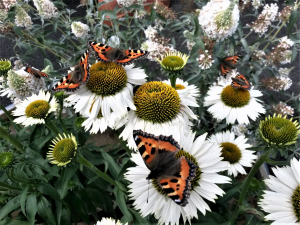Sustainable Flowers & Floristry (first published in West Sussex County Times)

Flowers are a precious part of our life-events, but are we aware of the significant environmental and human costs of the demand for cheap flowers at all times of the year?
Until the 1970s, bought flowers came from British farms, while today, most are grown commercially in Holland, Columbia, Ecuador and Kenya, routed through Dutch auctions. The flower industry has a massive carbon footprint, from heating greenhouses to refrigerated transport, a vast chemical footprint from pesticides, herbicides and preservatives, some banned in the UK, polluting soil and water, poisoning pollinators, impacting flower workers and their communities, many producers are not Fairtrade.
Plastic flower wrappings can be recycled at supermarkets, but Oasis floral foam, which was patented in the 1950s, is non-recyclable toxic phenol-formaldehyde microplastics, which can irritate eyes, skin and respiratory tract and some components are carcinogenic.
A research study published in ‘Science of the Total Environment’ in 2019, found the plastic foam, which breaks into tiny pieces, can be ingested by a range of freshwater and marine animals and affect their health. The floral foam microplastics also leach chemicals into the surrounding water and were more toxic to aquatic invertebrates than leachates from other plastics.
Thousands of tonnes of floral foam are used each year, much of which ends up in church and cemetery compost heaps and is estimated to take 400-500 years to break down. The new Bio Floral Foam biodegrades within 2-3 years in landfill but is still microplastics. Please try to avoid putting floral foam into compost or natural environments, or pouring water containing fragments down the sink or drains. Ideally, sieve water through a tight weave fabric and pour into a hole in the ground.
Last year, the RHS banned floral foams from all its garden and horticultural shows. Many churches and cathedrals are now reverting to traditional flower arranging, banning floral foams, using alternative ways to hold stems, including chicken wire, twigs, bottles, vases and other containers. Flowers last longer in water and potted plants, or bulbs are good alternatives.
Royal Florist and Sustainable Floristry Network Ambassador, Shane Connolly, said: “Foam is a convenience that we need to seriously reconsider as a whole industry if we want to do the right thing by the environment”.
Let’s plant shrubs and flowers, start to think seasonally, use locally grown or British sustainable flowers, and avoid contaminating marine life and food chains – it’s a win for people, plants and planet!
By Karen Park
Horsham Eco Churches

The Sustainable Church Flowers website offers advice and videos. https://suschurchflowers.com/
Sustainable floristry will be one of the conference topics at St. Mark’s Church, Holbrook, on Saturday 1st October, ‘Treasure, Safeguard and Care for Creation’. Free tickets: https://www.eventbrite.co.uk/e/treasure-safeguard-and-care-for-creation-tickets-400233247417



